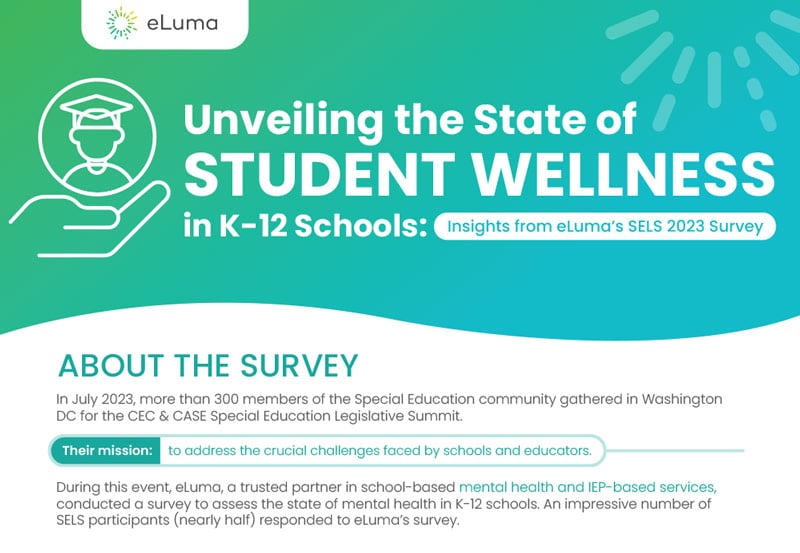The Special Education Legislative Summit 2023 (SELS 2023) hosted in Washington DC was a remarkable gathering of over 300 members of the special education community, united by a common mission: confronting the pressing challenges faced by our schools and educators. One of SELS 2023’s key issues is the mental health of K-12 students, a topic explored through a comprehensive survey of attendees and administered by eLuma.
eLuma, renowned for its commitment to providing school-based mental health and IEP-based services, conducted the survey, collecting responses from 127 attendees representing 27 states across the US. The results offer insight into how attendees view students’ prevailing mental health challenges, the existing support systems, and the much-needed improvements in our schools.
Key takeaways
-
- Anxiety is the most prevalent mental health challenge in K-12 schools, identified by over a third of the survey respondents, followed by behavioral regulation.
-
- There’s a significant lack of confidence in existing mental health services, with 46% of respondents doubting their school or district’s ability to provide adequate services.
-
- The most common support in place is professional development for staff (75%), but caregiver support & training is severely lacking (13%).
-
- There’s an urgent need for improved caregiver support & training, with 72% of respondents indicating a need for more to support student mental health.
-
- Contract services were identified as the most popular solution to address staffing shortages in mental health services.

Download the ‘Insights from the SELS 2023 Survey’ infographic [PDF]
School-wide Wellness Challenges
The most reported mental health or behavioral challenges encompass anxiety, behavioral regulation, emotional regulation, depression, and ADHD. Anxiety tops the list, with over a third of the respondents indicating it as the most prevalent issue, closely followed by behavioral regulation, flagged by 26% of respondents.
Anxiety is the #1 mental health/behavioral challenge facing students today.
Confidence in Current Services & Solutions
When respondents were asked how confident they were that their respective school or district provided adequate mental health services for all students, 46% expressed some doubt.
While 20% stayed neutral, less than 1% showed extreme confidence. This data points to a critical need for improvement and an opportunity to bolster our school communities.
Current Mental Health Services and Supports
Concerning the support and services at their respective schools to address these challenges, professional development emerged as the most provided solution by 75% of respondents’ schools. Following are psych evaluations, classroom guidance, and LCSW, each with 68% prevalence, and universal screeners offered by 53% of respondents’ schools. Despite these impressive statistics, the critical area of caregiver support & training was significantly underrepresented at just 13%.
Less than 1% of respondents are extremely confident that their school provides adequate school-wide mental health services.
Needed Services and Supports
Regarding required enhancements, the SELS 2023 survey findings affirm an urgent need for improved caregiver support and training, heightened emphasis on classroom guidance, universal screeners, staff professional development, and FTE counselors and psychologists. A striking 72% of respondents stated their schools need to offer more support and training to student caregivers.
Addressing Staffing Shortages
Responses to addressing staffing shortages in school-based mental health services were varied.
Popular solutions identified by respondents were:
-
- Contract Services
-
- Community Partnerships
-
- Grant Funding
-
- Professional Development
-
- Support Services
-
- Outside Agencies
What is School-Based Mental Health
When asked about the meaning of school-based mental health services and support, respondents identified eight key themes:
-
- Access and Availability
-
- Comprehensive and Holistic Support
-
- Identification and Intervention
-
- Collaboration and Teamwork
-
- Emotional and Behavioral Regulation
-
- Staff Training
-
- Integration with Learning
-
- Inclusivity
These principles shape a comprehensive framework for improving mental health support within our educational system.
While certainly a limited sample size, the insights from the SELS 2023 survey closely align with recent trends and serve as a crucial road map to the current state of mental health in K-12 schools. Our collective mission, powered by this valuable data, is to ensure students receive the support they deserve – making our schools not just a place of learning but also a sanctuary for growth and resilience, ensuring every student reaches their full potential.

